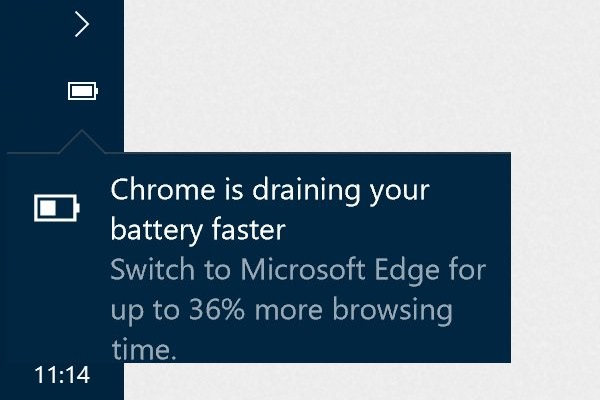Windows 10 warns users of Chrome and Firefox about increased energy consumption
The OS shows a notification of fast battery charge and recommends switching to Edge.

Microsoft is trying in every way to popularize its Edge browser. The methods used are unusual. Now in Windows 10 there are new tips for users. A number of tips related to the power consumption of third-party browsers. We are talking about Google Ghrome and Mozilla Firefox. Windows 10 warns the user that when working with these browsers the battery power of a laptop or tablet is consumed faster than when working with the native Edge browser. The solution is also proposed - this is the transition to Microsoft Edge.
')
"Microsoft Edge was created specifically for Windows 10. The capabilities of the browser ... provide easy data exchange, reading and searching," Microsoft said in a statement. A new collection of tips for users in Windows 10 was found by Rudy Huyn, an app developer for Windows Phone. He received one of the tips while working in a Windows 10 environment with a Chrome browser. A Microsoft representative said that similar notifications were also received by Firefox users in Windows 10. New tips were added in early July.
“Windows Tips was created to provide users with quick and useful information that helps them improve their Windows 10 experience, including information that helps users to increase battery life. However, in Windows 10, you can choose the browser and search service yourself, ”a Microsoft spokesman said.
Earlier, the corporation released a video demonstrating the low power consumption of Microsoft Edge compared to other browsers. The creators of the video put a number of four devices Surface Book with Microsoft Edge, Google Chrome, Mozilla Firefox and Opera. Each device launched a looped video in high resolution, the video stream was downloaded from the network via Wi-Fi. It is clear that the winner in this "competition" was a device with Microsoft Edge on board.
Soon the corporation will release Windows 10 Anniversary Update, and Edge will receive a number of improvements. A number of them are really interesting. This, for example, the termination of JavaScript on browser tabs, with which the user does not work. Such tabs will receive data in the background, after which, if necessary, it will be possible to quickly remove the “sleeping” tab from this mode. Energy consumption in this case can be reduced to 90%. In addition, Flash will work as a separate process. If something happens to Flash, the user can continue to work without problems. Also, browser developers rework a number of buttons, which will also provide energy savings. The number of frames for animated interface elements will be reduced, the load when drawing such elements will fall on the graphics adapter. Plus, the developers have changed some of the functions of working with the network. Changes affected the TCP Fast Open, Tail Loss Probe and Recent Acknowledgment, the Initial Congestion Window is optimized in the TCP stack.
Whatever it was, but some Microsoft tricks raise doubts about the legality of their use. This is not the first time the company is trying to influence the user in order to translate it into their own products. In 2015, similar methods were used in the search service of the company - Microsoft Bing. If the user Edge entered in the search service Bing queries like "chrome" and "firefox", he was shown all the necessary search results. But at the very top, the company showed a notice saying that "Microsoft recommends Microsoft Edge for Windows 10," with the "Find out why" button. When you click on the button, the user was transferred to the site, where he received comprehensive information about the benefits of Edge.

Both for requests for Chrome, and for requests for Firefox, a similar notification was displayed.

This information was shown to the user only once, when he started working with Edge on Windows 10 (mostly on the devices he just bought). A subsequent search for similar requests did not result in a demonstration of the notice of the benefits of the Edge.
In the 1990s, Microsoft faced charges of violating antitrust laws due to the inclusion of Internet Explorer in Windows. Now the situation is different, and Edge does not own a small share of the browser market, which was once occupied by Internet Explorer. But Microsoft is clearly looking for new ways to get new users - both by transferring IE fans to the new browser, and by those using Chrome or Firefox.
Source: https://habr.com/ru/post/396119/
All Articles